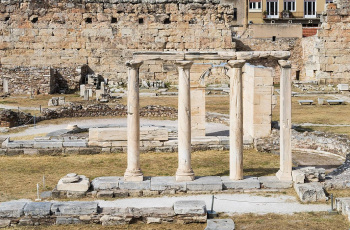We shall see how remarkably the Greeks served this purpose of spreaking the gospel when we consider their tendency to trade and colonization. Their mental activity was accompanied with a great physical restlessness, almost like people with ADD. This clever people always exhibited a disposition to spread themselves. Without aiming at universal conquest, they displayed a remarkable catholicity of character, and a singular power of adaptation to those whom they called Barbarians.
The Greeks were in strong contrast with the Egyptians, whose immemorial civilization was confined to the long valley which extends from the cataracts to the mouths of the Nile. The Hellenic tribes, on the other hand, though they despised foreigners, were never unwilling to visit them and to cultivate their acquaintance.
In the earliest period of the history of the Greeks we see them moving about in their ships on the shores and among the islands of their native seas. Three or four centuries before the Christian era, Asia Minor, beyond which the Persians had not been permitted to advance, was bordered by a fringe of Greek colonies.

Lower Italy, when the Roman republic was just beginning to be conscious of its strength, had received the name of Greece itself. To all these places they carried their arts and literature, their philosophy, their mythology, and their amusements. They carried also their arms and their trade. The Greeks were gradually taking the place of the Phoenicians in the empire of the Mediterranean.
Fruits from Alexander
With this view of the Hellenic character before us, we are prepared to appreciate the vast results of Alexander the Great's conquests. He took up the civilization of the Greeks, which was lying in disorder on the edges of the Asiatic shore, and spread it over all the countries which he traversed in his campaigns. The East and the West were suddenly brought together. Separated tribes were united under a common government. New cities were built as the centers of political life. New lines of communication were opened, as the channels of commercial activity.
The new Greek culture penetrated the mountain ranges of Pisidia and Lycaonia. The Tigris and Euphrates became rivers the Greeks controlled. The language of Athens was heard among the Jewish colonies of Babylonia, and a Grecian Babylon was built by the conqueror in Egypt, and called by his name.
The empire of Alexander was divided, but the effects of his campaigns and policy did not cease. The influence of the fresh elements of social life was rather increased by being brought into independent action within the spheres of distinct kingdoms. Our attention is particularly called to two of the monarchical lines, which descended from Alexander's generals. They were the Ptolemies, or the Greek kings of Egypt, and the Seleucids, or the Greek kings of Syria.
The respective capitals of Egypt and Syria, which were Alexandria and Syrian Antioch, became the metropolitan centers of commercial and civilized life in the East. They rose suddenly and their very appearance marked them as the cities of a new epoch. They were modern cities built by great kings at a definite time and for a definite purpose. Their histories are no unimportant chapters in the history of the world.
Capital connection
Both capitals influenced by the Greeks, Alexandria and Antioch, were connected with the Apostle Paul. One of them indirectly, as the birthplace of Apollos, the other directly, as the scene of some of the most important passages of the Apostle's own life. Both became the residence of Roman governors, and both afterwards were patriarchates of the primitive Church.
But before they had received either the Roman discipline or the Christian doctrine, they had served their appointed purpose of spreading the Greek language and habits, of creating new lines of commercial intercourse by land and sea, and of centralizing in themselves the mercantile life of the Levant.
Of all the elements of the Greeks which the cities of Antioch and Alexandria circulated, the most important one was the spread of the language. Its connection with the whole system of Christian doctrine, with many of the controversies and divisions of the Church, is very momentous. That language, which is the richest and most delicate that the world has seen, became the language of theology. The tongue of the Greeks became to the Christian more than it had been to the Roman or the Jew.
It is difficult to state in a few words the important relation which Alexandria more especially was destined to bear to the whole Christian Church. In that city, the representative of the Greeks of the East, where the most remarkable fusion took place of the peculiarities of Greek, Jewish, and Oriental life, and at the time when all these had been brought in contact with the mind of educated Romans. A theological language was formed, rich in the phrases of various schools, and suited to convey Christian ideas to all the world.
It was not an accident that the New Testament was written in the language of the Greeks, the language which can best express the highest thoughts and worthiest feelings of the intellect and heart, and which is adapted to be the instrument of education for all nations. It was not an accident that the composition of these books and the promulgation of the Gospel were delayed, till the instruction of our Lord, and the writings of His Apostles, could be expressed in the dialect of Alexandria.